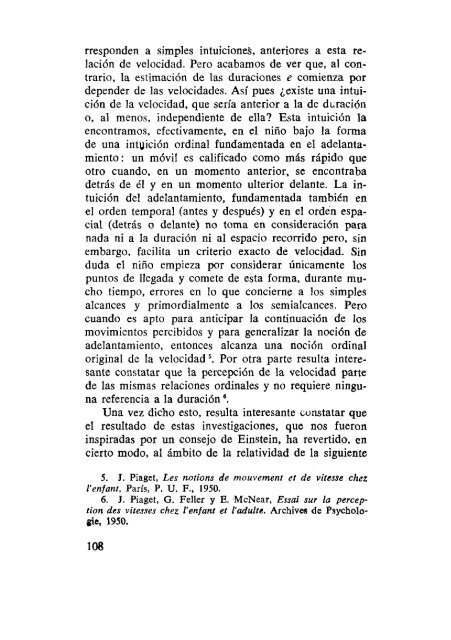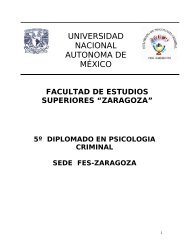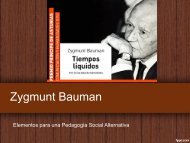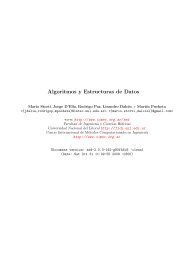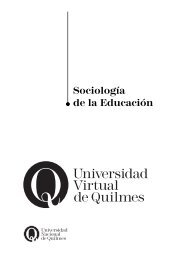SEIS ESTUDIOS DE PSICOLOGÍA Jean Piaget - Colegio de la Loza
SEIS ESTUDIOS DE PSICOLOGÍA Jean Piaget - Colegio de la Loza
SEIS ESTUDIOS DE PSICOLOGÍA Jean Piaget - Colegio de la Loza
You also want an ePaper? Increase the reach of your titles
YUMPU automatically turns print PDFs into web optimized ePapers that Google loves.
espon<strong>de</strong>n a simples intuiciones, anteriores a esta re<strong>la</strong>ción<br />
<strong>de</strong> velocidad. Pero acabamos <strong>de</strong> ver que, al contrario,<br />
<strong>la</strong> estimación <strong>de</strong> <strong>la</strong>s duraciones e comienza por<br />
<strong>de</strong>pen<strong>de</strong>r <strong>de</strong> <strong>la</strong>s velocida<strong>de</strong>s. Así pues ¿existe una intuición<br />
<strong>de</strong> <strong>la</strong> velocidad, que sería anterior a <strong>la</strong> <strong>de</strong> duración<br />
o, al menos, in<strong>de</strong>pendiente <strong>de</strong> el<strong>la</strong>? Esta intuición <strong>la</strong><br />
encontramos, efectivamente, en el niño bajo <strong>la</strong> forma<br />
<strong>de</strong> una intuición ordinal fundamentada en el a<strong>de</strong><strong>la</strong>ntamiento<br />
: un móvil es calificado como más rápido que<br />
otro cuando, en un momento anterior, se encontraba<br />
<strong>de</strong>trás <strong>de</strong> él y en un momento ulterior <strong>de</strong><strong>la</strong>nte. La intuición<br />
<strong>de</strong>l a<strong>de</strong><strong>la</strong>ntamiento, fundamentada también en<br />
el or<strong>de</strong>n temporal (antes y <strong>de</strong>spués) y en el or<strong>de</strong>n espacial<br />
(<strong>de</strong>trás o <strong>de</strong><strong>la</strong>nte) no toma en consi<strong>de</strong>ración pata<br />
nada ni a <strong>la</strong> duración ni al espacio recorrido pero, sin<br />
embargo, facilita un criterio exacto <strong>de</strong> velocidad. Sin<br />
duda el niño empieza por consi<strong>de</strong>rar únicamente los<br />
puntos <strong>de</strong> llegada y comete <strong>de</strong> esta forma, durante mucho<br />
tiempo, errores en lo que concierne a los simples<br />
alcances y primordialmente a los semialcances. Pero<br />
cuando es apto para anticipar <strong>la</strong> continuación <strong>de</strong> los<br />
movimientos percibidos y para generalizar <strong>la</strong> noción <strong>de</strong><br />
a<strong>de</strong><strong>la</strong>ntamiento, entonces alcanza una noción ordinal<br />
original <strong>de</strong> <strong>la</strong> velocidad I Por otra parte resulta interesante<br />
constatar que <strong>la</strong> percepción <strong>de</strong> <strong>la</strong> velocidad parte<br />
<strong>de</strong> <strong>la</strong>s mismas re<strong>la</strong>ciones ordinales y no requiere ninguna<br />
referencia a <strong>la</strong> duración'.<br />
Una vez dicho esto, resulta interesante constatar que<br />
el resultado <strong>de</strong> estas investigaciones, que nos fueron<br />
inspiradas por un consejo <strong>de</strong> Einstein, ha revertido, en<br />
cierto modo, al ámbito <strong>de</strong> <strong>la</strong> re<strong>la</strong>tividad <strong>de</strong> <strong>la</strong> siguiente<br />
5. J. <strong>Piaget</strong>, Les notions <strong>de</strong> mouvement et <strong>de</strong> vltesse chez<br />
Venfant. París, P. U. F., 1950.<br />
6. J. <strong>Piaget</strong>, G. Feller y E. McNear, Essai sur <strong>la</strong> perception<br />
<strong>de</strong>s vitesses chez l'enfant et l'adulte. Archives <strong>de</strong> Psychologic,<br />
1950.<br />
108


